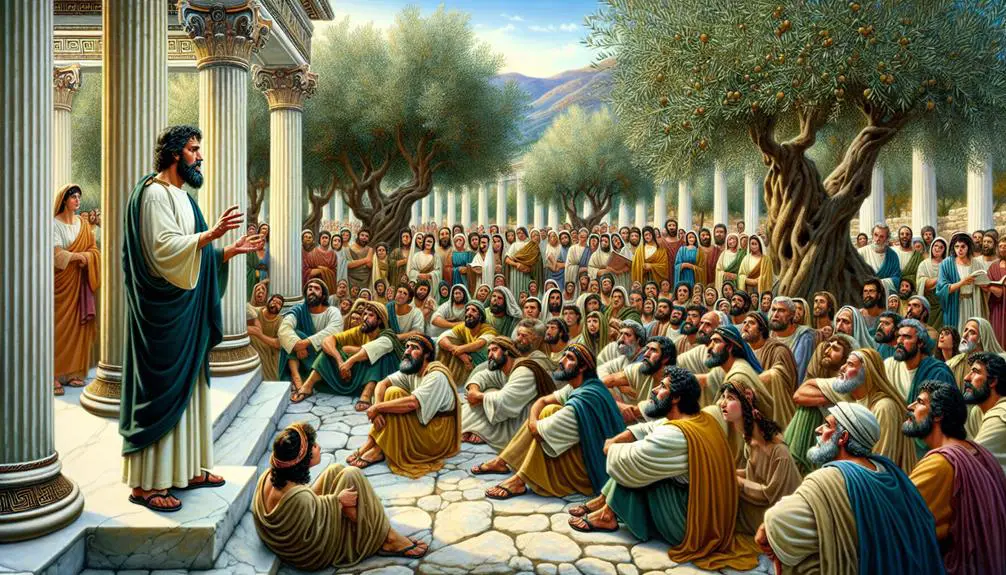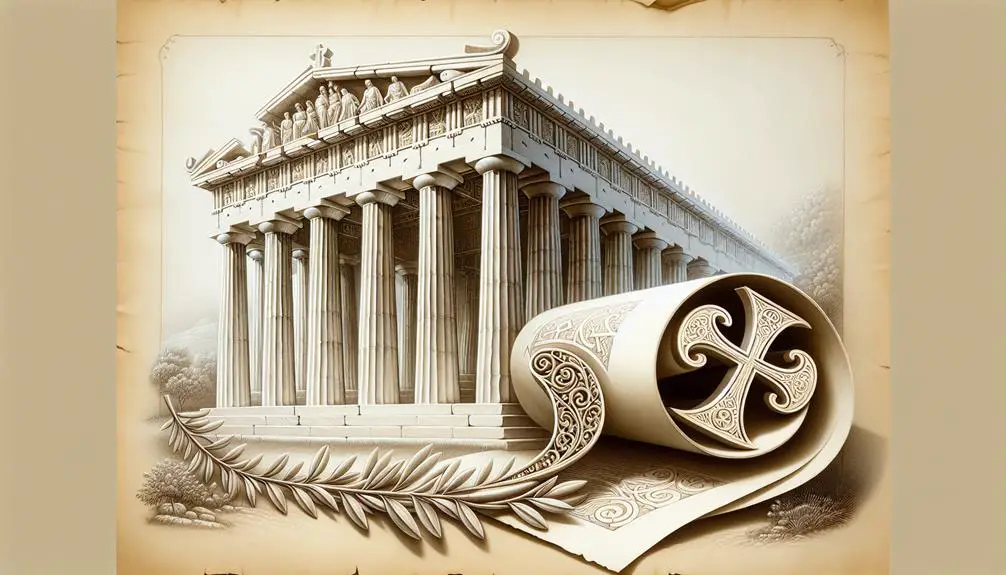Witness how the Greeks in the Bible not only cross paths with early Christians but fundamentally shape the unfolding of faith and theology.

Who Are the Greeks in the Bible
As a thread weaving through the tapestry of biblical narratives, the Greeks play a pivotal yet often understated role in shaping the course of events and ideologies. You'll find that their influence is not just a backdrop but a dynamic force interacting with the early Christian community.
From Paul's mission to bring the Gospel to the Greek-speaking world to the philosophical underpinnings that Greek thought provided to Christian theology, there's a rich landscape to explore.
The question then beckons: how did these interactions mold the faith as you know it today? This inquiry isn't just about tracing historical connections but understanding the fabric of a faith that encompasses diverse cultures and philosophies.
Key Takeaways
- Greeks in the Bible include influential converts like Lydia and eloquent defenders of faith such as Apollos.
- Greek culture significantly shaped early Christianity, blending Biblical teachings with Hellenistic philosophies.
- Paul's missions to Greek cities like Corinth demonstrate the early church's outreach to Greek-speaking communities.
- Figures like Timothy and Titus highlight the integration of Greek and Jewish believers in the formation of the Christian church.
Greeks in the New Testament

In the New Testament, Greeks appear as significant figures, illustrating the early Christian message's broad appeal beyond Jewish communities. This inclusion of Greeks indicates a crucial shift, highlighting the transition from a predominantly Jewish Christian community to a more diverse one. The role of Hellenistic Judaism is pivotal in this context. As you delve deeper, you'll find that Hellenistic Judaism, a blend of Jewish religious traditions and Greek culture, served as a bridge, facilitating the spread of Christianity among Greek-speaking populations. This syncretism made the early Christian message more accessible and appealing to Greeks, who were already familiar with a fusion of their cultural practices with religious beliefs.
Furthermore, the significance of Greek translations of Hebrew Scriptures can't be overstated. The Septuagint, a prominent Greek translation of the Jewish Bible, played a crucial role in this cultural and religious interchange. It not only made Jewish scriptures accessible to Greek speakers but also enriched the dialogue between Jewish and Greek philosophical traditions. Through these translations, concepts central to Christian theology were communicated in a language and within cultural contexts that Greeks could understand and relate to.
This integration of Greek language and culture within the early Christian movement underscored the universality of the Christian message. It was no longer confined to a specific ethnic or cultural group but was reaching out to a broader audience. This period marks the beginning of Christianity's transformation into a world religion, underlining the importance of Greeks in the New Testament and their contribution to the early church's expansion.
Paul's Mission to the Greeks

Paul's mission to the Greeks significantly advanced the spread of Christianity, demonstrating its appeal beyond Jewish boundaries and into the heart of Hellenistic culture. His journey was marked by significant encounters and the establishment of churches, notably among the Greek-speaking populations of the Eastern Mediterranean. Paul's engagement with the Greeks was multifaceted, involving dialogue, preaching, and the writing of epistles, some of which would become crucial texts within the Christian New Testament.
One of the most emblematic moments of Paul's outreach to the Greeks occurred at the Athens Areopagus, where he delivered a sermon that skillfully incorporated Hellenistic philosophical concepts to make the Christian message accessible to his Greek audience. This event underscores the strategic and adaptable approach Paul employed in his mission.
Key aspects of Paul's mission to the Greeks include:
- Preaching at strategic locations: Paul chose significant cultural and religious centers, such as Athens, to preach, ensuring his message reached a wide and diverse audience.
- Engagement with local philosophies: At the Athens Areopagus, Paul demonstrated his familiarity with Greek philosophy, using it to bridge the gap between the Gospel and Hellenistic culture.
- Establishment of the Corinthian church: Paul's work in Corinth resulted in the formation of a vibrant Christian community, which is evidenced by the two epistles addressed to the Corinthian church, highlighting the challenges and successes of a church within a predominantly Greek context.
- Adaptation of message: Paul's ability to adapt Christian teachings to resonate with Greek cultural and philosophical norms was pivotal in the successful spread of Christianity among the Greeks.
Through strategic engagement and adaptability, Paul's mission not only facilitated the spread of Christianity within Hellenistic society but also illustrated the universal appeal of its message.
Greek Influences on Christianity

Exploring the profound impact of Greek culture, philosophy, and language, we see that Christianity absorbed and was significantly shaped by Hellenistic influences. At the intersection of these cultures lay Hellenistic Judaism, which served as a conduit for the transmission of Greek philosophical concepts into early Christian thought. This blending of traditions facilitated the spread of Christianity within the Greco-Roman world, making it accessible and palatable to a Greek-speaking audience.
The influence of Greek philosophy is evident in the early Christian emphasis on the Logos, a term borrowed from Greek philosophy but significantly reinterpreted in Christian theology. This concept of the Logos, or the Word, provided a bridge between Jewish monotheism and Greek philosophical understandings of reason and order in the universe. It allowed early Christians to engage with the intellectual currents of their time, embedding their nascent theology within a familiar Hellenistic framework.
Moreover, the use of the Greek language in the New Testament texts themselves is a testament to the Hellenistic context in which Christianity developed. Greek became the lingua franca of the early Christian community, which was a strategic choice that enabled the dissemination of Christian texts and ideas across the Mediterranean world.
However, it's crucial to distinguish between the influence of Greek culture and the wholesale adoption of Greek mythology. While early Christianity was open to Hellenistic philosophical ideas, it maintained a clear distinction from Greek mythological narratives, focusing instead on the uniqueness of its monotheistic vision and the historical reality of Jesus Christ. This discernment allowed Christianity to absorb and transform Hellenistic elements without losing its distinct identity.
Key Greek Figures in the Bible

Who were the key Greek figures mentioned in the Bible, and what roles did they play in its narratives and teachings? The New Testament, in particular, highlights several individuals of Greek origin or Greek-speaking Jews, often referred to as Hellenistic Jews. These individuals not only contributed to the early Christian community but also exemplified the blending of Greek culture with Jewish and Christian beliefs.
Among these key figures, you'll find:
- Timothy: A notable Greek convert and companion of Paul, Timothy's mixed heritage as the son of a Jewish mother and a Greek father provided a unique bridge between Jewish and Greek communities.
- Titus: Another Greek companion of Paul, Titus played a crucial role in the early Christian church, particularly in gentile communities, showcasing the outreach and acceptance of Greek converts within the faith.
- Lydia: Mentioned in the Book of Acts, Lydia, a seller of purple from the city of Thyatira, wasn't only a Greek convert but also the first recorded convert in Europe, highlighting the spread of Christianity into the Greek-speaking world.
- Apollos: A Hellenistic Jew from Alexandria, Apollos is described in Acts as an eloquent speaker and a learned man, deeply versed in the Scriptures, who vigorously defended the Christian faith in debates.
These individuals represent the significant influence of Greek converts and Hellenistic Jews within the early Christian community. Their stories underline the diverse backgrounds of early Christians and the inclusive nature of the Christian message, bridging cultural and ethnic divides.
Greek Philosophy and Biblical Teachings

The intersection of Greek philosophy and biblical teachings presents a complex landscape where ideas of morality, existence, and the divine converge and diverge in intriguing ways. You'll find that Greek philosophy, with its rich tradition of inquiry and debate, offers a starkly different approach to understanding the world compared to the revelatory and faith-based nature of biblical teachings. At the heart of this intersection are Aristotelian ethics and Socratic dialogues, which provide a profound contrast to biblical narratives and commandments.
Aristotelian ethics, emphasizing virtue as a means to achieve eudaimonia (a state of being where one lives in accordance with reason and achieves a good life), contrasts with the biblical emphasis on obedience to God's commandments as the path to righteousness and fulfillment. Meanwhile, Socratic dialogues, with their relentless questioning and pursuit of truth, challenge the certainty and authority often found in biblical narratives.
To convey a deeper meaning, consider the following table:
Greek Philosophy |
Biblical Teachings |
|---|---|
Emphasizes rationality and logic |
Focuses on faith and revelation |
Seeks virtue through ethical conduct |
Commands obedience to divine laws |
Encourages questioning and dialogue |
Values acceptance and faith |
Pursues an individualistic approach to morality |
Emphasizes a communal moral responsibility |
Views the divine as abstract and philosophical |
Portrays God as a personal, interactive being |
This table highlights the contrast and convergence between Greek philosophy and biblical teachings. Understanding these differences and similarities enriches your appreciation of both philosophical inquiry and religious faith, illustrating the multifaceted nature of the search for meaning and morality.
Frequently Asked Questions
How Did the Greek Language Come to Be Used in Various Parts of the Bible, and What Impact Did It Have on the Translation and Interpretation of Biblical Texts?
You're exploring how Greek became a key language for parts of the Bible, impacting its translation and interpretation.
This linguistic evolution played a crucial role in Scripture's accessibility and understanding. Greek's adoption into biblical texts ensured a wider audience could engage with its teachings, affecting scriptural authenticity by shaping interpretations.
This process highlights the dynamic nature of language in religious texts, underlining the importance of linguistic shifts in biblical scholarship and interpretation.
In What Ways Did Greek Culture and Society, Outside of Philosophical Teachings, Influence the Daily Lives and Spiritual Practices of Early Christians?
In examining how Greek culture shaped early Christian lives, you'll find Greek cuisine and athletic competitions played significant roles.
Greek culinary practices influenced the dietary habits, introducing new flavors and dishes into their daily lives.
Similarly, the Greek tradition of athletic competitions introduced concepts of physical fitness and sportsmanship, which were embraced by some Christian communities.
These aspects of Greek society enriched the daily and spiritual lives of early Christians beyond mere philosophical teachings.
Are There Any Documented Instances of Conflict or Cooperation Between Greek Communities and Other Ethnic Groups Mentioned in the Bible?
You're exploring instances of interaction, particularly conflicts or cooperation, between Greek communities and other ethnic groups. Greek colonization and Roman conflicts provide a rich backdrop for this analysis.
Historically, Greeks often encountered and engaged with various peoples through colonization, leading to a blend of confrontations and collaborations.
Roman rule, meanwhile, brought its own set of conflicts and cooperations, with Greeks navigating these dynamics within a broader ethnic and cultural mosaic.
How Did the Spread of Hellenism Under Alexander the Great Affect the Geographical Regions and Cultures Mentioned in the Bible?
Alexander the Great's military campaigns drastically reshaped the biblical regions, spreading Hellenism far and wide.
You'll notice that his conquests not only expanded geographical boundaries but also deeply influenced local cultures.
Architectural influence is evident, as Greek styles merged with local traditions, creating a unique blend.
This cultural fusion affected everything from language to governance, leaving a lasting legacy on the societies mentioned in the Bible.
Can We Identify Any Specific Greek Customs or Traditions That Were Adopted or Adapted by Biblical Figures in Their Personal or Communal Worship Practices?
You're exploring how specific Greek customs might've influenced biblical figures' worship practices. It's challenging to pinpoint direct adaptations, but consider the cultural exchanges.
Greek pottery, often depicting religious ceremonies, could've introduced new ritual ideas. Similarly, the Olympic games, a blend of sport and worship, might've inspired communal gatherings with a competitive edge in biblical times.
These elements suggest a nuanced blending of Greek traditions with existing practices, rather than outright adoption.
Conclusion
In essence, as you've delved into the intricate tapestry of the Bible, it's clear that the Greeks aren't just a footnote but a vibrant thread woven throughout.
Your exploration of Paul's mission, the palpable Greek influences on Christianity, pivotal figures, and the intertwining of Greek philosophy with biblical teachings illuminates a picture as complex and interconnected as a mosaic.
This scholarly journey underscores the profound impact of Hellenistic culture on the development of early Christian thought, showcasing a historical interplay that's as enriching as it's enlightening.



Sign up